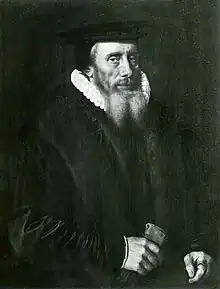goropism
English
Etymology

From Goropius + -ism (suffix forming names of schools of thought, systems, or theories), possibly influenced by French goropiser (“to goropize”), coined by the German philosopher and scientist Gottfried Wilhelm Leibniz (1646–1716) in his work Nouveaux essais sur l’entendement humain (New Essays on Human Understanding, written 1704, published 1765).[1]
Goropius was the name of the Dutch physician and linguist Johannes Goropius Becanus (1519–1573) who hypothesized that the oldest language on earth would be the simplest language, and since Brabantic (a Dutch dialect) had more short words than Greek, Hebrew, or Latin, it was the language spoken by Adam and Eve in the Garden of Eden from which all other languages derived. The name is from Dutch Gorp (“hamlet in Hilvarenbeek, Noord-Brabant, Netherlands”) (Goropius’ birthplace) + Latin -ius (suffix forming adjectives from nouns, and used to Latinize surnames).
Pronunciation
- (Received Pronunciation) IPA(key): /ɡəˈɹəʊpɪzm̩/
Audio (Southern England) (file) - (General American) IPA(key): /ɡəˈɹoʊpɪz(ə)m/
- Hyphenation: go‧rop‧i‧sm
Noun
goropism (usually uncountable, plural goropisms) (linguistics)
- A hypothesis, similar to the one originally propounded by Goropius which is now discredited, that some attested or modern language such as Dutch, Hebrew, or Turkish was the original language of human beings.
- 1994, Jan Such, “The Leibniz-Einstein Principle of the Minimization of Premises”, in Leibniz und Europe: VI Internationaler Leibniz-Kongres: Vorträge 1. Teil, Hannover, Lower Saxony, page 765; republished in Multiformity of Science (Poznań Studies in the Philosophy of the Sciences and the Humanities; 79), Leiden, South Holland: Brill Publishers, 2003, →ISBN, part II (The Nature of Scientific Cognition), paragraph 1, page 119:
- In Book III of G[ottfried] W[ilhelm] Leibniz's New Essays on Human Understanding […] there is a statement on the subject of the so-called goropism, which provided the basis for the principle that is referred to by some scientists and scholars as the Leibniz-Einstein's principle (or postulate) […]. Leibniz uses the term "goropism" to refer to the procedure correlating a false theory with any feasible experiment by means of reacting to empirical results which contradict the theory with the continual introduction of newer and newer assumptions […].
- 2010 December, Savasan Yurtsever, “1919”, in Psalms Code II: The Secret of the Lord: Almanac of Mankind: The Jesus Cycle, [Scotts Valley, Calif.]: [CreateSpace], →ISBN, page 341, column 2:
- [B]ased upon a helio-centric view of the origin of civilization and human languages, the theory claimed that the Turkish language was the language which all civilized languages derived from. Thanks to goropism, some remarkable results were obtained: the word for school is derived from Turkish okul (school). God is from Turkish kut (luck). Bulletin is from belleten (to learn by hearth[sic – meaning heart?]). Electric is from Uyghur yaltrik (shine).
- An absurd etymology proposed as part of such a hypothesis.
- 1995, Umberto Eco, “The Monogenetic Hypothesis and the Mother Tongues”, in James Fentress, transl., edited by Jacques Le Goff, The Search for the Perfect Language (The Making of Europe), Oxford, Oxfordshire, Cambridge, Mass.: Blackwell Publishing, →ISBN, page 96:
- He [Johannes Goropius Becanus] produced a string of arguments whose level of etymological wishful thinking matched those of Isidore and [Estienne] Guichard; they later became known as ‘becanisms’ or ‘goropisms’.
- 2017, David Grant, “Babylon: The Cipher and Rosetta Stone”, in In Search of the Lost Testament of Alexander the Great, Kibworth Beauchamp, Leicestershire: Matador, →ISBN, page 465:
- But lest we be accused of textual goropism, we should take a closer look at the evidence.
Hypernyms
Translations
|
|
References
- [Gottfried Wilhem] Leibniz (written 1704; published 1765) “[Nouveaux essais sur l’entendement humain.] De la signification des mots. [[New Essays on Human Understanding.] Of the Meaning of Words.]”, in Oeuvres philosophiques latines & françoises de feu Mr. De Leibnitz. […] [Latin & French Philosophical Works of the Late Mr. De Leibniz. […]], Amsterdam, Leipzig: Chez Jean Schreuder, →OCLC, book III, § 1, page 243:
- [THEOPHILE.] [E]n general l’on ne doit donner aucune creance aux etymologies que lorsqu’il y a quantité d’indices concourans: autrement c’eſt goropiſer. / PHILAL[ÈTHE]. Goropiſer? Que veut dire cela? / THEOPH. C‘est que les Etymologies etranges & ſouvent ridicules de Goropius Becanus, […]
- [THEOPHILE.] [I]n general one should give no credence to etymologies only when there is a quantity of concurrent indices; otherwise it is goropizing. / PHILAL[ÈTHE]. Goropize? What does that mean? / THEOPH. It is because of the strange and often ridiculous etymologies of Goropius Becanus, […]
Further reading
 Johannes Goropius Becanus on Wikipedia.Wikipedia
Johannes Goropius Becanus on Wikipedia.Wikipedia